Diesel Engines Explained: The Ultimate Guide to Power & Efficiency
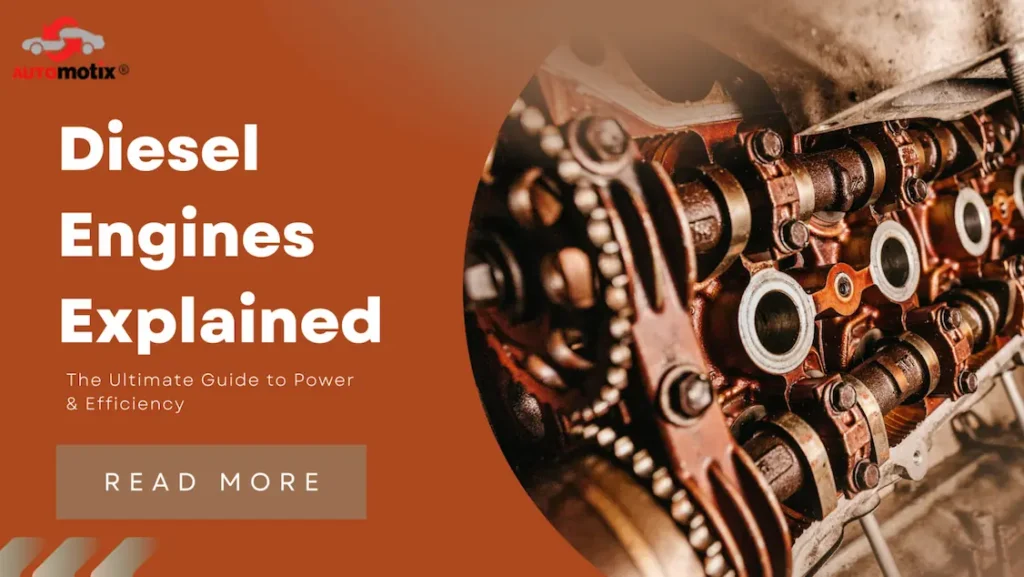
Introduction
Picture this: a heavy-duty pickup truck confidently pulling a trailer up a steep mountain pass, barely breaking a sweat. Think of the delivery van that reliably rumbles to life on the coldest winter morning, ready for a full day’s work. Or it’s the surprising efficiency of a modern sedan that cruises past gas station after gas station. The common thread powering these scenes of strength and endurance? The remarkable diesel engine.
For many, the term “diesel” might conjure images of loud, smoky trucks from a bygone era. But the reality of the modern diesel engine is far more sophisticated. It’s a story of incredible power, surprising efficiency, and longevity. Yet, it remains one of the most misunderstood workhorses in the automotive world.
That’s why we’ve created this guide. We’re here to pull back the curtain and demystify the diesel engine, from the simple principles that make it unique to its real-world applications in vehicles of all shapes and sizes.
For over 20 years, Automotix has been a trusted source for quality auto parts, including the powerful and efficient diesel engines that drive America. We’ve connected thousands of drivers, mechanics, and fleet managers with the parts they need to keep their vehicles on the road. In this guide, we’re sharing our decades of expertise to help you understand everything you need to know about them.
We’ll explore how diesel engines work, break down their pros and cons, share essential maintenance tips, and even show you how a high-quality used diesel engine can be one of the smartest purchases you can make. Let’s dive right into it.
Summary
This guide from Automotix provides an in-depth look at diesel engines, covering everything from their fundamental workings to their real-world benefits. You’ll discover:
- How they work: Learn about the unique compression-ignition process and the four-stroke cycle that sets diesel apart from gasoline engines.
- Key advantages: Understand why diesels are praised for their immense torque, superior fuel efficiency, exceptional longevity, and impressive reliability.
- Important considerations: Get a clear picture of factors like higher upfront costs, specialized maintenance, and modern emissions systems.
- Why used makes sense: Find out why a high-quality used diesel engine can be a smart, economical choice and what to look for when buying one.
- Maintenance tips: Essential advice to ensure your diesel engine runs efficiently for hundreds of thousands of miles.
Table of Contents
- What is a Diesel Engine?
- The Four-Stroke Diesel Cycle Explained
- Anatomy of a Diesel Engine
- Why Choose a Diesel Engine?
- Considerations While Purchasing a Diesel Engine
- Why a Used Diesel Engine Makes Sense
- What to Look For in a Used Diesel Engine
- Why Automotix is Your Best Source
- Automotix’s Nationwide Network
- Diesel Engine Maintenance Tips
- Conclusion
- Frequently Asked Questions (FAQ)
What is a Diesel Engine?
At its core, a diesel engine is a type of internal combustion engine, just like its gasoline counterpart. Both are designed to convert the chemical energy in fuel into mechanical energy that moves a vehicle. But how they achieve this is fundamentally different, and that difference is the secret to the diesel’s unique character.
In the simplest terms, a diesel engine uses the intense heat generated from compressing air to ignite its fuel. There’s no spark plug involved.
Think of it like this: a gasoline engine needs a spark plug to get the party started—it provides the initial flash to ignite a mixture of air and fuel. A diesel engine, on the other hand, creates its own heat. It uses immense pressure to squeeze air so tightly that it becomes hot enough to ignite the fuel on its own.
This fundamental contrast leads to three key distinctions that define the diesel engine:
Ignition
The most critical difference is how combustion begins. A gasoline engine is a spark-ignition engine. It compresses a mixture of air and fuel, and then a precisely timed spark from the spark plug ignites it. A diesel engine is a compression-ignition engine. It first draws in and compresses only air. By squeezing this air to a ratio of anywhere from 14:1 to over 22:1, the temperature inside the cylinder can skyrocket to over 1,000°F (540°C). Then, a fine mist of fuel is injected, which spontaneously combusts in the superheated air. This method is more direct and forceful, which is a key reason for the diesel’s powerful nature.
Fuel
Diesel fuel itself is different. It’s denser and more energy-rich than gasoline. According to the U.S. Energy Information Administration (EIA), a gallon of diesel fuel contains about 13% more energy than a gallon of gasoline. This higher energy density means that for every drop of fuel burned, a diesel engine can extract more power, contributing directly to its superior fuel efficiency and torque.
Air/Fuel Mixture
In a gasoline engine, air and fuel are mixed together before they enter the combustion chamber. The engine carefully controls this air-fuel ratio. A diesel engine works differently. During its intake stroke, it draws in only air. The fuel is injected separately, directly into the cylinder at the last possible moment. This means the engine isn’t “throttled” by controlling airflow in the same way a gas engine is; instead, its power is controlled by how much fuel is injected. This “lean burn” process, where there is always an excess of air, is another major reason for the diesel’s impressive fuel economy, especially at idle or under light loads.
The Four-Stroke Diesel Cycle Explained
Now that we understand the core differences, let’s look inside and see how a diesel engine converts fuel into force. The entire process is a synchronized dance that happens thousands of times per minute, broken down into four distinct stages, or “strokes.”
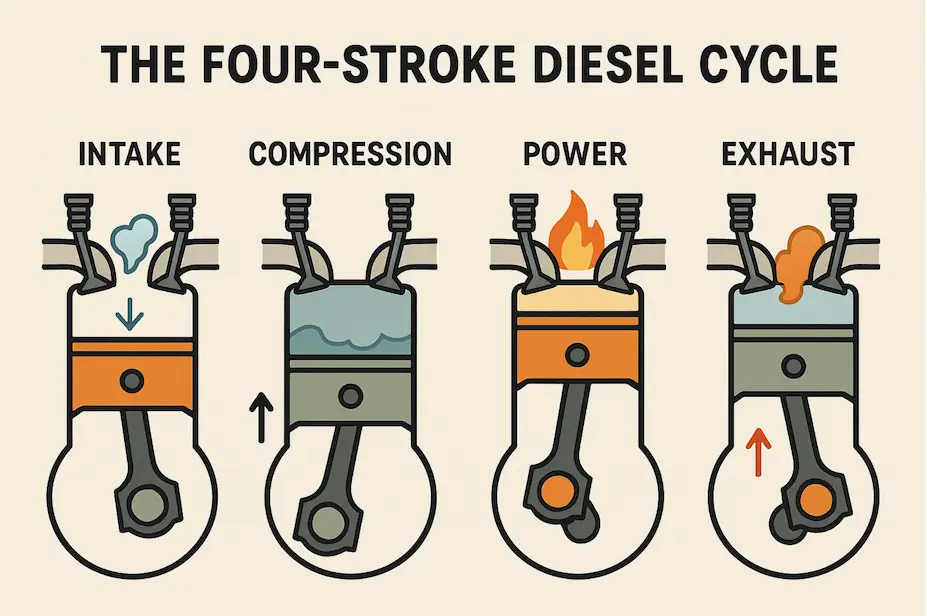
This entire sequence is known as the four-stroke cycle, a process fundamental to most modern internal combustion engines, but with a unique diesel twist.
The Intake Stroke
The cycle begins with the piston at the top of the cylinder. As it starts to travel downward, the intake valve opens, creating a vacuum. But unlike a gasoline engine that would be sipping an air-fuel cocktail, the diesel engine draws in only pure air. It takes a deep, clean breath, filling the cylinder completely by the time the piston reaches the bottom of its travel.
The Compression Stroke
This is where the magic happens. With the intake and exhaust valves now fully closed, the piston reverses course and travels back up the cylinder. This upward movement aggressively compresses the trapped air, squeezing it into a space more than 15 times smaller than its original volume. As anyone who has used a manual bicycle pump knows, compressing air generates heat. On this massive scale, the pressure builds to over 500 PSI, and the temperature of the air skyrockets to well over 1,000°F (540°C), hot enough to ignite paper, and more than enough for what comes next.
The Power Stroke
At the absolute peak of the piston’s travel, when the air is at its hottest and most compressed, the fuel injector fires. It sprays a precise, fine mist of diesel fuel directly into the scorching-hot air. The result is instantaneous and violent: the fuel ignites immediately, creating a massive expansion of gas that forces the piston down with incredible force. This is the power stroke. It’s the single event that sends power to the crankshaft, and it’s the source of the immense torque that diesel engines are famous for.
The Exhaust Stroke
After the piston has been driven to the bottom of the cylinder, the exhaust valve opens. The piston then travels back upward one last time, pushing the spent gases from the combustion process out of the cylinder and into the exhaust system. Once the piston reaches the top, the exhaust valve closes, the intake valve opens, and the entire four-stroke cycle begins again, ready to create more power.
Anatomy of a Diesel Engine
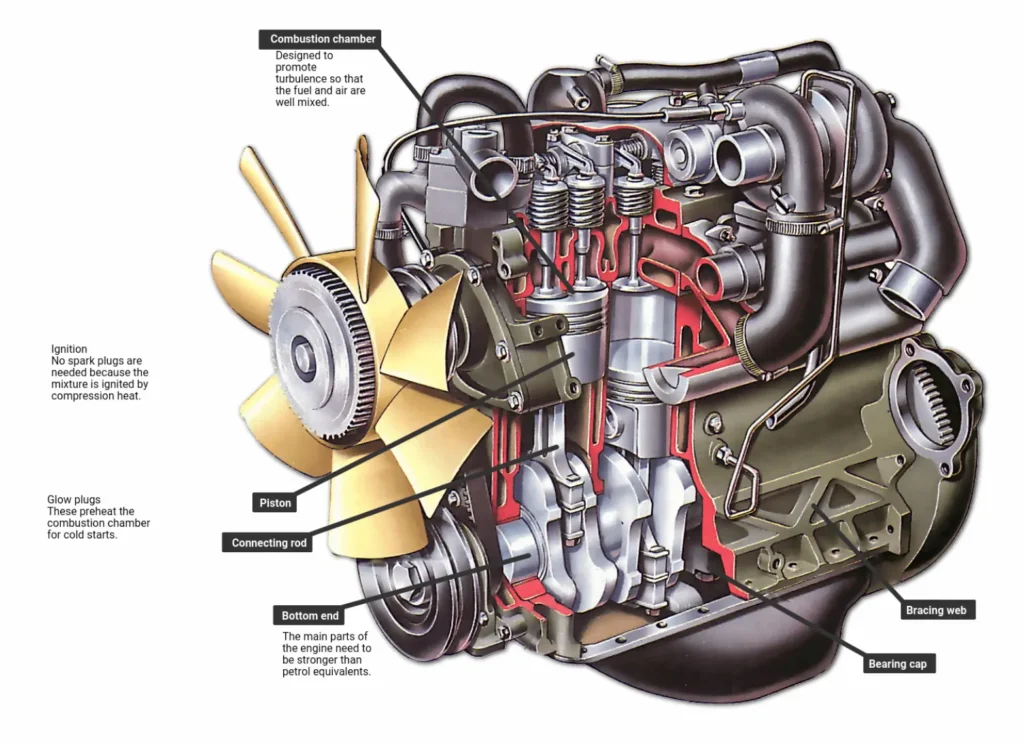
A diesel engine is a marvel of robust engineering, built to withstand immense pressures and deliver reliable power for hundreds of thousands of miles. While it has many parts in common with a gasoline engine, its key components are typically stronger and more specialized. Let’s take a look at the essential parts that make up this powerhouse.
Engine Block & Cylinders
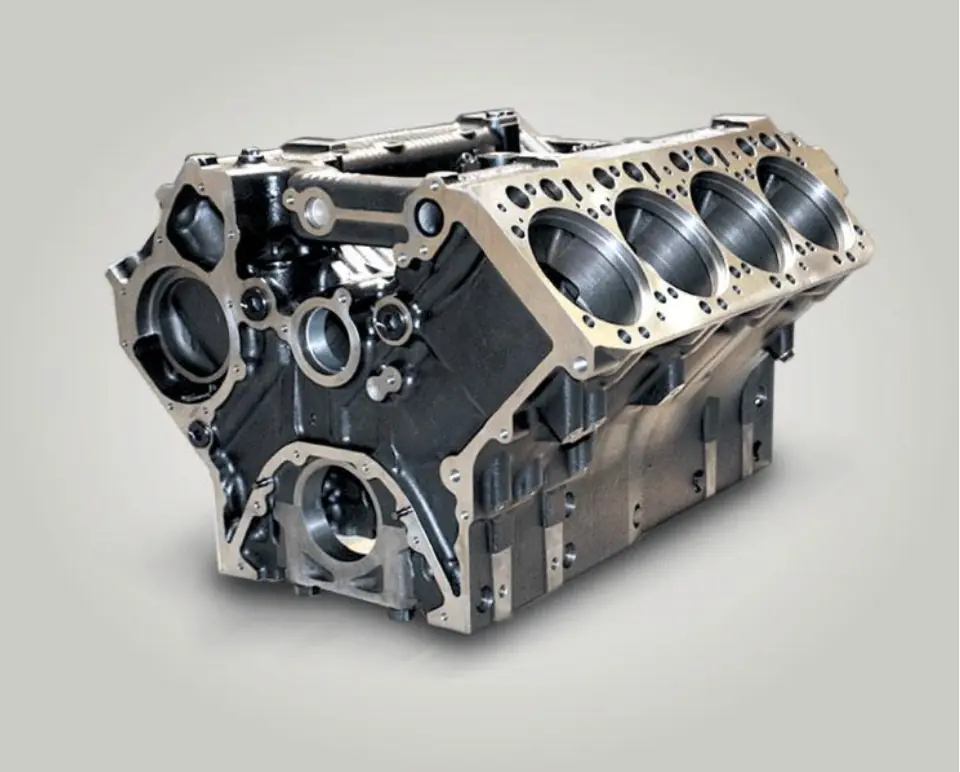
This is the literal foundation of the engine, usually a massive casting of iron or aluminum that houses all the other internal parts. The cylinders are the carefully machined bores within the block where the pistons travel. Due to high compression ratios, diesel engine blocks are exceptionally strong and heavy-duty, forming the core of the engine’s legendary durability.
Pistons & Connecting Rods
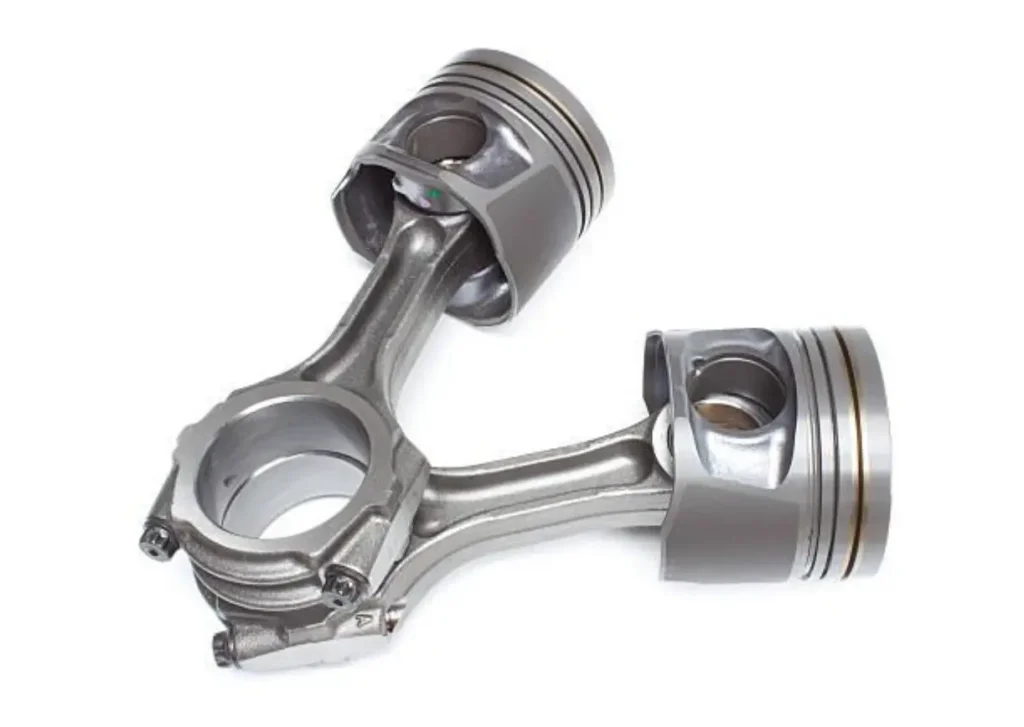
These are the components that face the full fury of combustion. The piston is a cylindrical plug that moves up and down inside the cylinder. It’s connected to the crankshaft by a connecting rod. In a diesel engine, pistons are designed to endure extreme heat and pressure, often featuring a unique “bowl” shape on their top surface to promote the efficient mixing of fuel and air during combustion.
Cylinder Head & Valves
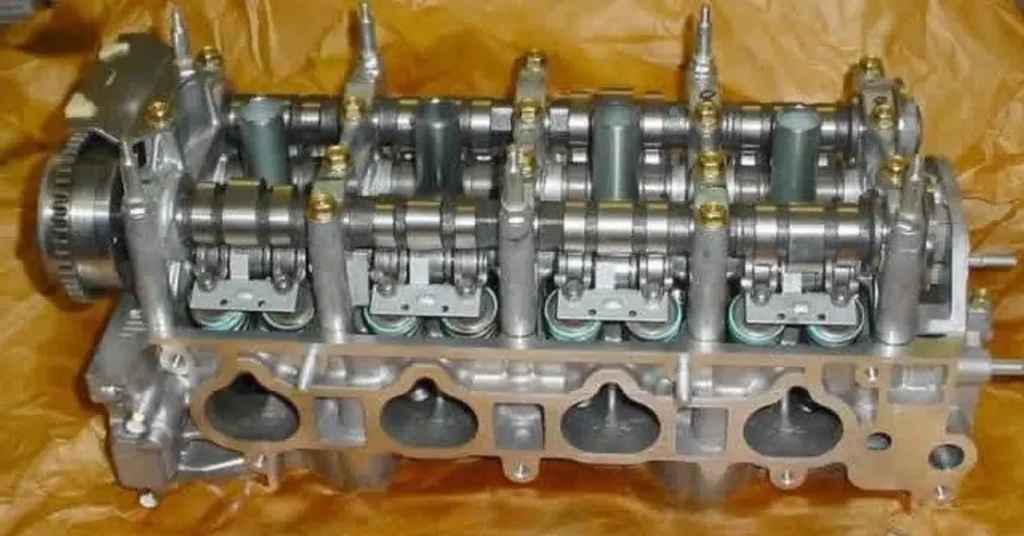
A cylinder head assembly, showing valvetrain components like camshafts, valves, and springs.
Bolted to the top of the engine block, the cylinder head seals the combustion chamber and houses the engine’s “breathing” apparatus. This includes the intake and exhaust valves, which are precisely timed to open and close, allowing air to enter and exhaust to exit the cylinders. A flawless seal between the head and the block is critical to maintaining compression.
Fuel Injectors
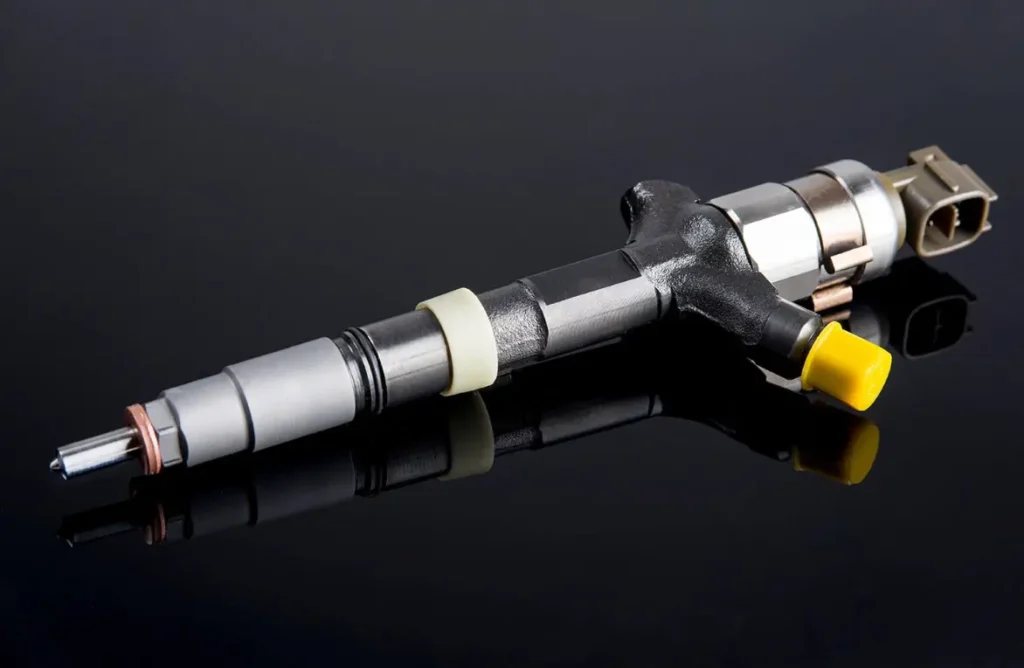
If the engine block is the foundation, the fuel injectors are the heart of a diesel. These are highly sophisticated, high-pressure nozzles that deliver an incredibly fine, atomized mist of fuel into the combustion chamber at the perfect moment. The precision of the fuel injectors is paramount to the engine’s power, efficiency, and emissions.
Turbocharger
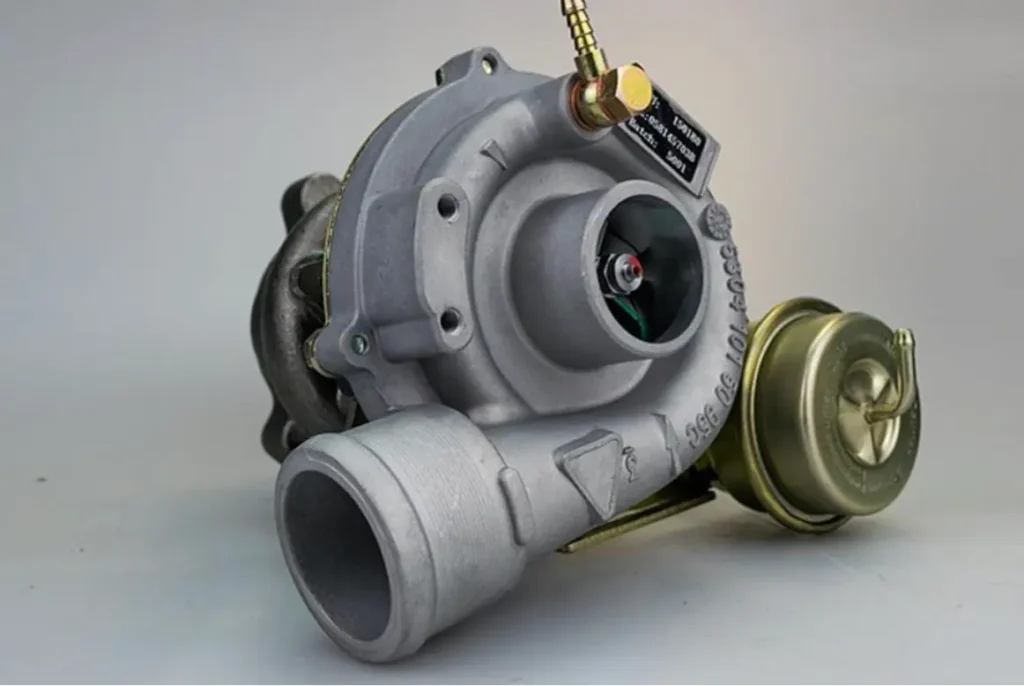
This is the secret to modern diesel power. A turbocharger is essentially an air pump driven by the engine’s own exhaust gases. It spins a turbine that forces a massive amount of extra air into the cylinders. More air means more fuel can be burned, resulting in a much bigger power stroke. This is why even smaller diesel engines can produce such astonishing torque.
Glow Plugs
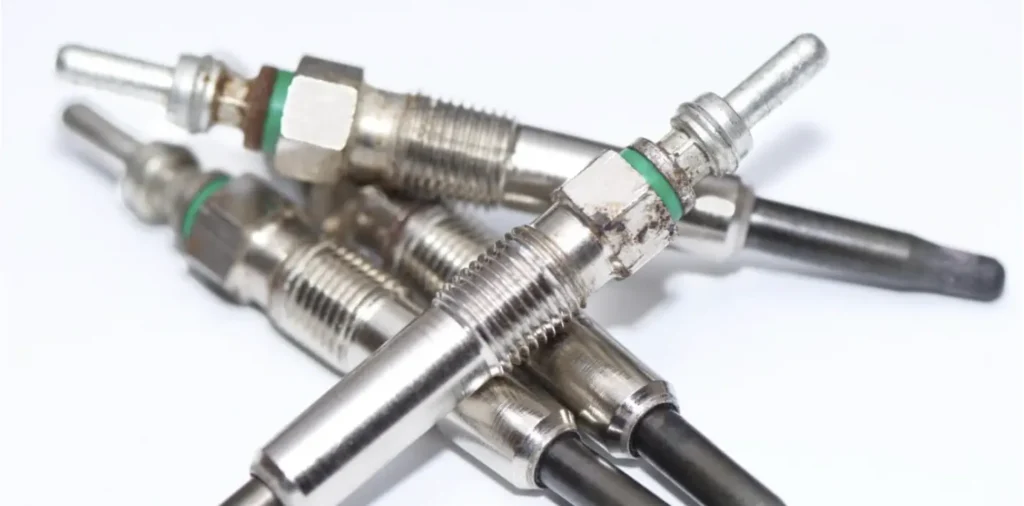
A diesel engine relies on the heat of compression to ignite its fuel, which can be a challenge on a cold day when the engine block is frigid. Glow plugs are small electric heaters inside the combustion chamber that preheat the air, ensuring a quick and reliable start in cold weather.
Crankshaft
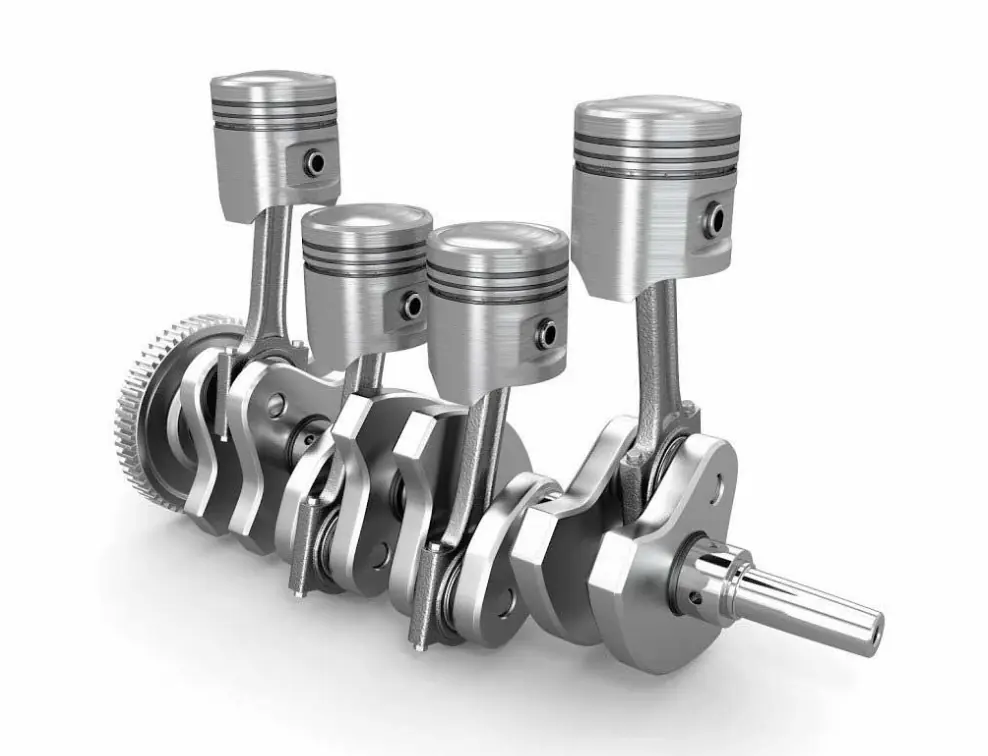
Located at the bottom of the engine, the crankshaft is the component that works magic. It converts the violent up-and-down (linear) motion of the pistons into the rotational force needed to turn the vehicle’s wheels.
Understanding these parts helps appreciate the engine as a complete system. And when one of these components wears out, finding the right replacement is key to restoring your engine’s performance.
Need to replace a specific part? Automotix has a nationwide network of suppliers for everything from high-pressure fuel injectors to complete turbo assemblies.
Why Choose a Diesel Engine?
Now that we’ve seen how a diesel engine works and the robust parts it’s built from, we can answer the most important question: why would you choose one? The unique design of the diesel engine translates directly into four powerful, real-world advantages that have made it the go-to choice for the toughest jobs and the most demanding drivers.
Torque & Towing Power
This is the benefit you can feel. Torque is the rotational force that gets your vehicle moving, and diesel engines are the undisputed kings of low-end torque. This power comes directly from that forceful power stroke we talked about. The slower, more sustained expansion of gases pushes down on the piston with massive force, even at low engine speeds. What does that feel like on the road? It’s the ability to pull a heavy boat up a slippery ramp without drama. It’s hauling a fully-loaded trailer up a steep grade while the engine remains relaxed and unstrained. It’s that confident surge of power when you merge onto the highway, even with the bed of your truck full of gear. A diesel doesn’t need to scream at high RPMs to do its best work; the power is available right where you need it.
Fuel Efficiency
It may seem counterintuitive that such a powerful engine can also be a fuel-sipper, but it’s one of the diesel’s most significant advantages. On average, a diesel engine is 25-30% more fuel-efficient than a comparable gasoline engine. This impressive efficiency comes from two core factors we’ve already covered: the fuel itself contains more energy, and the high-compression combustion cycle extracts more power from every single drop. As the U.S. Department of Energy notes, this “lean burn” operation makes them highly efficient, especially on long highway drives where they can achieve incredible mileage, saving you money at the pump.
Longevity & Durability
There’s a reason you see so many old diesel trucks still working hard on the road. Diesel engines are famously “overbuilt.” In order to withstand the immense pressures of compression ignition, often twice that of a gasoline engine, every component is engineered to be tougher, stronger, and more robust. The engine block, crankshaft, pistons, and connecting rods are all designed with a higher margin of safety. This built-in toughness directly translates to a longer service life. While a gasoline engine might be considered “high mileage” at 150,000 miles, a well-maintained diesel is often just getting broken in. Lifespans of 300,000, 400,000, or even 500,000 miles are not uncommon.
Reliability
Durability leads directly to reliability. Because their core components are so rugged, diesel engines are less prone to catastrophic failure under heavy use. They are true workhorses, built to perform day in and day out without complaint. Furthermore, their design is inherently simpler in one key area: they have no spark plugs, spark plug wires, or distributors. By eliminating this entire high-voltage ignition system, a common source of maintenance headaches and breakdowns in gasoline vehicles is removed from the equation, adding to their reputation for steadfast dependability.
Considerations While Purchasing a Diesel Engine
No engine is perfect for every situation, and a truly balanced look means acknowledging the unique considerations that come with diesel ownership. Being aware of these aspects is key to making an informed decision and ensures there are no surprises down the road. By presenting an honest picture, we help you decide if the powerful advantages of a diesel truly align with your needs.
Higher Upfront Cost
When buying a brand-new vehicle, the diesel engine option almost always comes with a higher price tag than its gasoline equivalent. This initial investment reflects the cost of the engine’s more robust, “overbuilt” components and the sophisticated, high-pressure fuel systems required for its operation. This higher entry price for new vehicles is a primary factor for many buyers and a crucial point to consider when budgeting. (As we’ll discuss later, this is also why a quality used diesel engine can offer such a compelling value).
Maintenance & Repair Costs
While diesels are legendary for their longevity, it’s a fact that when a major repair is needed, it can be more expensive. Components like high-pressure fuel pumps, turbochargers, and precision fuel injectors are more complex and costly to replace than the parts in a typical gasoline engine. Furthermore, not every garage has the specialized tools or knowledge to work on them, so finding a qualified diesel mechanic is important for proper service. The trade-off for incredible durability is that the cost of fixing these specialized parts is higher.
Modern Emissions Systems
To meet today’s strict environmental standards, modern diesel vehicles are equipped with highly effective exhaust treatment systems. You’ll often hear about Diesel Exhaust Fluid (DEF), a solution that is injected into the exhaust stream to break down harmful nitrogen oxides into harmless water and nitrogen. These systems also include a Diesel Particulate Filter (DPF) to capture and burn off soot. While these technologies make modern diesels run incredibly clean, they do require periodic maintenance. Refilling the DEF tank is now a simple, routine part of diesel ownership, much like an oil change, but it is an extra step to be aware of.
The Characteristic Noise
You can’t talk about diesels without mentioning the sound. The distinct “clatter” or “rumble,” especially at idle, is a direct result of the compression-ignition process—it’s the sound of power being created under immense pressure. While manufacturers have made huge strides in quieting their engines with advanced engineering and sound-deadening materials, a diesel still sounds like a diesel. For some, this sound is an iconic part of the experience; for others, it’s a downside compared to the whisper-quiet operation of a modern gasoline or hybrid vehicle.
Why a Used Diesel Engine Makes Sense
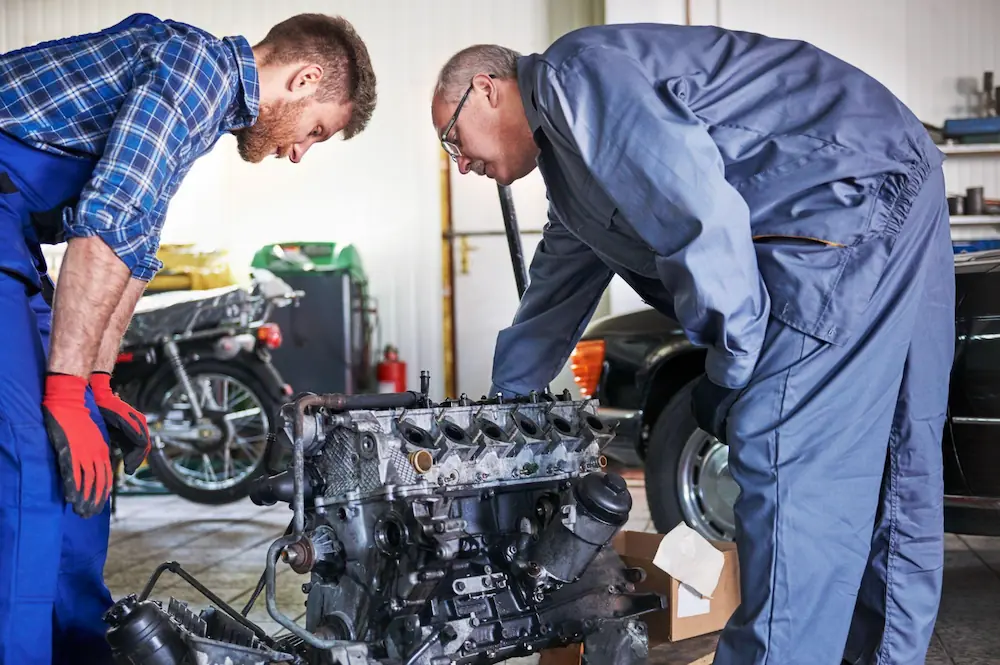
We’ve talked about the impressive power of diesel engines, their rugged durability, and their few, but important, considerations, especially the higher cost of buying new. This is where the smart buyer can gain a serious advantage. What if you could get all the legendary benefits of diesel power without the steep initial price tag?
This isn’t just possible; it’s the most practical choice for countless drivers. A high-quality, low-mileage used diesel engine from a reputable source like Automotix gives you all the benefits of diesel power and longevity for a fraction of the cost. You get the torque, the efficiency, and the long life, all while making a financially sound decision.
However, buying a used engine requires a bit of knowledge. Here’s what you need to look for to ensure you’re getting a fantastic value.
What to Look For in a Used Diesel Engine
Mileage and History
The first rule of buying a used diesel is to forget what you know about gasoline engine mileage. A gas engine with 150,000 miles might be nearing the end of its life, but a well-maintained diesel with the same mileage is often considered to be in its prime. Look for engines with a clear service history when possible, but don’t be scared by six-figure mileage. Focus instead on the reputation of the vehicle model it came from and the assurances of the supplier.
A Reputable Supplier
This is the single most important factor. Where you buy your engine from matters more than anything else. Sourcing from a trusted network is critical because it means the engine has likely been inspected and its condition verified by professionals. A reputable supplier reduces your risk and ensures you’re not buying someone else’s problem.
An Included Warranty
Never buy a used engine without a warranty. Period. A warranty isn’t just a piece of paper; it’s a statement of confidence from the seller. It provides a crucial safety net and peace of mind, protecting your investment and ensuring that the supplier stands behind the quality of their product.
Guaranteed Compatibility
A modern engine is more than just a block of metal; it’s deeply integrated with your vehicle’s computer systems. It’s essential that the replacement engine is an exact match for your vehicle. The best way to guarantee this is by using your Vehicle Identification Number (VIN). Automotix utilizes the industry-standard Hollander Interchange Cataloging system to ensure precise compatibility, taking the guesswork out of your purchase. A perfect match ensures that all the connections, from the transmission to the electronics, will work seamlessly.
Why Automotix is Your Best Source

Navigating the world of used engines can be complex, but we make it simple. For over two decades, Automotix has specialized in connecting customers with the best used auto parts in the country.
Vast Inventory
We provide access to a nationwide network of hundreds of professional auto recyclers and suppliers. This massive inventory means you have a much better chance of finding the specific, low-mileage diesel engine you need for your exact make and model.
Quality Assurance
We don’t just sell parts; we provide a trusted connection. We connect you with reputable suppliers who understand the importance of quality. Many of the engines in our network are tested and verified before they are even listed, giving you confidence in your purchase.
Expert Support
Not sure which engine is the right one? Our team is here to help. Provide us with your VIN, and our specialists can help you pinpoint the exact engine you need, eliminating the guesswork and ensuring perfect compatibility.
Direct Call to Action
Ready to find the perfect diesel engine for your truck or car? Search our inventory now or call our specialists for a free quote.
Automotix’s Nationwide Network
While guaranteed compatibility is crucial, Automotix goes a step further. Our nationwide network of professional auto recyclers and suppliers means we don’t just find a diesel engine that fits your application; we often provide multiple options for the same vehicle. This allows you to choose an engine based on various factors beyond just fit, such as mileage, specific quality assurances, and even price points, ensuring you get the best possible value that aligns with your needs and budget. We empower you with choices, so you’re not just getting a replacement part, but the right replacement part for you.
Diesel Engine Maintenance Tips
A diesel engine’s reputation for longevity isn’t just about how it’s built; it’s also about how it’s maintained. Because they operate under such high stress, diesels depend on clean fluids and clean air to perform at their best and reach that legendary 300,000-mile mark and beyond. The good news is that the most critical maintenance tasks are straightforward. Think of them as simple investments that protect your engine in the long run.
Respect the Oil Change
An oil change is not just an oil change in a diesel. The engine oil has a tougher job to do, as it must handle the higher temperatures, immense pressures, and soot that are byproducts of diesel combustion. Always use the specific grade of oil recommended by your vehicle’s manufacturer (you can find this in your owner’s manual). Using the wrong oil can lead to premature wear and damage. Regular, on-time oil changes with the correct oil are the single most effective thing you can do to ensure a long engine life.
Make Fuel Filters Your Best Friend
This is a non-negotiable for any diesel owner. The fuel injection systems in these engines are marvels of precision, operating at incredibly high pressures. Even microscopic particles of dirt or water in the fuel can cause catastrophic damage to the expensive fuel pump and injectors. Your fuel filters are the only line of defense. Changing them at the recommended intervals is cheap insurance against a repair bill that could run into the thousands.
Let It Breathe with a Clean Air Filter
Because a turbocharged diesel engine consumes a massive volume of air, the air filter plays a vital role. A clogged or dirty filter restricts airflow, forcing the engine to work harder, which hurts both your fuel economy and overall performance. Regularly inspecting and replacing your air filter is a simple, inexpensive task that pays immediate dividends in efficiency and power.
Don’t Ignore the Warning Lights
Your vehicle’s dashboard is its way of communicating with you, and it’s wise to listen. Diesel vehicles have specific warning lights that you won’t see on a gasoline car. A light for the glow plugs, the Diesel Particulate Filter (DPF), or the Diesel Exhaust Fluid (DEF) system is an early warning. Ignoring these can turn a minor issue, like the need to drive at highway speeds to allow the DPF to clean itself, into a major one that can damage expensive emissions components or even put the vehicle into a reduced-power “limp mode.” Address these warnings promptly to keep your engine running clean and strong.
Conclusion
We’ve explored the inner workings of diesel engines, highlighting their remarkable combination of power, efficiency, and durability. From the immense torque that effortlessly handles tough jobs to the impressive fuel economy that saves money at every mile, diesel engines offer advantages that are hard to match. Their robust construction ensures a long, reliable service life, making them a trusted choice for both work and daily driving.
Choosing a high-quality used diesel engine is a smart and economical decision. It allows you to benefit from diesel’s legendary capabilities without the steep initial costs associated with new engines. By sourcing from a trusted provider, you ensure compatibility, quality, and peace of mind, setting yourself up for years of dependable performance.
Whether you’re repairing your vehicle, upgrading your fleet, or building your dream project, Automotix has the diesel engine and parts to get the job done right. Explore our extensive inventory today and experience firsthand the Automotix difference.
Looking to purchase a used diesel engine? Automotix has the largest collection of diesel engines for different makes and models. Explore more at Used Diesel Engines
Frequently Asked Questions (FAQ)
Q: Can I put a diesel engine in any car?
A: Technically, it’s possible to put a diesel engine in most vehicles, but it requires extensive modifications, compatibility checks, and expert knowledge. It’s often more practical to select a vehicle already designed for diesel power.
Q: How many miles is too many for a used diesel engine?
A: Unlike gasoline engines, a well-maintained diesel engine can perform reliably even after 300,000 miles. Mileage alone isn’t the deciding factor; always look at maintenance records, vehicle history, and buy from reputable sources.
Q: Are diesel engines bad for the environment?
A: Modern diesel engines feature advanced emissions control systems like Diesel Exhaust Fluid (DEF) and Diesel Particulate Filters (DPF). These technologies significantly reduce harmful emissions, making today’s diesel engines much cleaner and environmentally friendly compared to older models.
Q: Do I need a special mechanic for a diesel engine?
Yes, diesel engines have specific maintenance requirements and complexities. It’s best to use mechanics trained and experienced with diesel engines to ensure proper servicing and avoid costly repairs.
About the Author / Automotix Team: This guide was crafted by the seasoned experts at Automotix, a leading name in the used auto parts industry since 2000. With over two decades of dedicated experience, our team has been at the forefront of connecting buyers with high-quality, certified used OEM auto parts across the USA. We pride ourselves on leveraging cutting-edge technology to streamline the auto parts buying experience, offering an unparalleled inventory and a commitment to customer satisfaction that has established us as a trusted authority. Our mission is to empower car owners, DIY mechanics, and repair shops with the knowledge and the right parts to keep vehicles running efficiently and affordably, contributing to both individual savings and a more sustainable automotive future.


